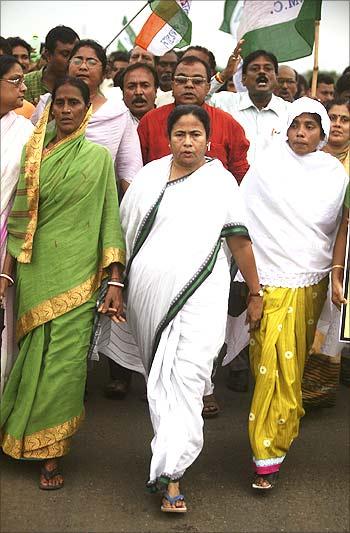
A day after the Mamata Banerjee-led West Bengal government issued an ordinance to take back the entire land lying with Tata Motors and its vendors at Singur, it has decided not to notify it.
The state government will now amend the Land Acquisition Act, 1894, and introduce a 'Singur' Bill in the Assembly. The Assembly, initially scheduled to meet from June 24, will now be in session from June 13.
"The Singur Bill will be tabled in the Budget session. We are keeping aside the ordinance for now, even though it has been signed by the Governor," Chief Minister Mamata Banerjee said.
The Bill would be tabled after the governor's address. "This will be the only Bill to be tabled in the Budget session. The parliamentary affairs minister will speak about technical things, because I don't know the system here. I have done politics in Parliament, but I think I am not wrong," Banerjee added.
The move follows protest from the Left Front on the ordinance over technical issues. Leader of the Opposition and the CPI (M) leader, Surya Kanta Misra, led a Left Front delegation that met Governor M K Narayanan on Friday and voiced its concerns.
. . .

"This is unconstitutional, the House has been adjourned, but is still in session. An ordinance can be passed only if the House is not in session," Misra said, after the meeting with the governor.
Meanwhile, officials in the state government said the governor on Friday met Chief Secretary Samar Ghosh and raised some technical points over the ordinance.
"The ordinance needs not be withdrawn, as it has not been notified. An ordinance is promulgated only if it is notified," said an official close to the development.
"Once an ordinance is issued, it needs to be notified in state gazette. This follows from Dicey's Rule of Law. Whenever a law is made, it has to be notified publicly, so that people are aware of that law. The same practice applies to ordinance as well. After an ordinance is issued, it will be made public in a gazette at the earliest. Only after that, action can be taken on the basis of that ordinance," former professor of political science and principal of Kolkata's Presidency College, Amal Kumar Mukhopadhyay, said.
. . .

Moreover, the ordinance did not have approval of the Cabinet. The Cabinet had approved the return of 400 acres to unwilling farmers, but not an ordinance.
"The disputed 400 acres will be returned to farmers, while Tata Motors is welcome to set up its project on the remaining 600 acres," Banerjee had said yesterday while announcing the ordinance.
Legal experts pointed out that the ordinance was Singur-specific, but amendment to the Land Acquisition Act was unlikely to be specific to Singur. "It will probably be an amendment that will enable return of unused land to farmers, which the Land Acquisition Act does not provide for," they said.
Also, the ordinance would have made the agreement between Tata Motors and the West Bengal Industrial Development Corporation (WBIDC) null and void, but an amendment would not. The amendment would also require the President's approval, since it is a Central Act.
If the amendment was not specific to Singur, there might also be land losers elsewhere in Bengal who might want their land back, a CPI(M) leader said.